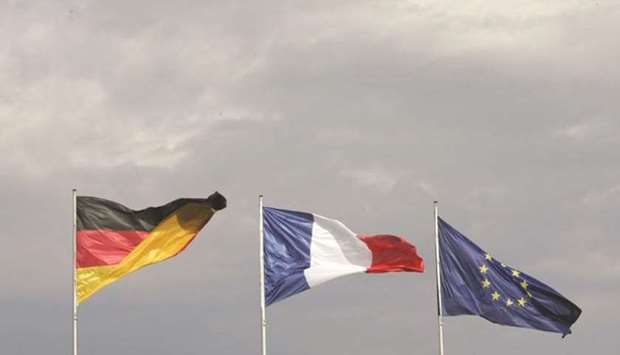Initially, the big losers in Germany’s federal election in September were a Frenchman and a Luxembourger: French President Emmanuel Macron and European Commission President Jean-Claude Juncker. Each has his own plan for reforming the European Union, and both envision deeper integration, starting with the eurozone.
For his part, Juncker has called on all non-euro member states to adopt the single currency, and has even proposed a roadmap for them to do so. Macron, meanwhile, has called for a more deeply integrated eurozone with a common budget, which would be funded, in part, by an EU-wide financial transactions tax (currently only France and the United Kingdom levy an FTT). He has also called for the appointment of a eurozone finance minister, and for measures to harmonise corporate taxes and minimum wages across member states.
Both Juncker and Macron’s plans would require German co-operation. Germany, however, has little enthusiasm for EU-level economic reforms, because it benefits from the status quo. A common monetary policy in the absence of a common fiscal policy creates an imbalance that works decidedly in Germany’s favour. Because Germany, the eurozone’s largest economy, shares a currency with poorer member states, it enjoys an artificial boost to export competitiveness.
Moreover, while Germany is the world’s second-largest exporter (after China), it does not buy much with its surpluses, which means that other EU countries, particularly in the poorer south, cannot earn. The result is a crisis-generating arrangement that has so far been impossible to correct, even with social transfers and other instruments to rebalance economic development across the eurozone.
Germany has essentially dropped an anchor that is now preventing all of Europe from moving forward. And that would be the case even if German Chancellor Angela Merkel had managed to forge a coalition between her Christian Democratic Union (CDU), the Bavaria-based Christian Social Union (CSU), the Free Democrats (FDP), and the Greens. After all, the FDP is essentially the political arm of German business.
Of course, things might be different if the Social Democrats (SPD) agree to rejoin the CDU and CSU in a grand coalition government. But just how different remains unclear. Having received its smallest share of the popular vote since World War II, the SPD is severely weakened, and may be unable to pursue anything but the least controversial items on its domestic agenda.
Hans Kundnani of the German Marshall Fund surmises that by voting for the Eurosceptic FDP and the far-right Alternative für Deutchland (AfD), rather than the CDU and SPD, German voters have already expressed their views on Macron’s plan to reform the eurozone. If he is right, the SPD would be committing political suicide if it supported EU-level reforms.
Then again, all of the ongoing debates about EU reform could prove to be irrelevant, given that the power to decide the bloc’s fate may lie not in Western Europe, but in the East. While Merkel weighs Macron’s proposals, she is undoubtedly thinking of Germany’s primary economic partner: the Visegr?d Group (V4), comprising the Czech Republic, Hungary, Poland, and Slovakia.
The numbers speak for themselves. According to the Frankfurter Allgemeine Zeitung, the combined volume of trade between Germany and the V4 in 2016 was €256bn ($303bn), far outweighing China (€170bn) and France (€167bn).
The Czech and Slovak economies are often regarded as extensions of the German economy; and Germany is an equally crucial partner for Hungary and Poland. Moreover, Germany’s trade with the V4 is growing fast, with a year-on-year increase of 9% in 2016, while its trade with France, traditionally its largest trading partner, grew at a sluggish 0.6% that year.
But while Germany has managed to assert its economic dominance across the region, it has also become more dependent on its increasingly populist eastern neighbours. German businesses cannot simply replace their current trading partners on a whim. And besides, no other region has the same ideal combination of low-cost labour, a well-educated workforce, high rates of economic growth, geographic proximity, and even political stability.
That’s right: while almost every other European country (including Germany) is struggling to form a government, or has settled for an unstable ruling coalition, the provincial strongmen in Poland, Slovakia, and Hungary can guarantee stability. Whatever one thinks of Hungarian Prime Minister Viktor Orban and his brand of “illiberal democracy,” there is no denying that he has created a secure environment for German business interests. The same cannot be said for Russia – whose volume of trade with Germany is only around the same as that of Hungary.
While Germany justifies its populist appeasement economically, other countries have also started to recognise the V4’s appeal. Just this week, Chinese Premier Li Keqiang announced that the Chinese Development Bank will invest an additional €2bn in Central and Eastern Europe.
China is positioning itself as an economic and technological rival to the EU and the United States. And, because China itself is ceasing to be a source of cheap labour, it is looking for potential subcontractors – like the V4.
The title of the Bulgarian public intellectual Ivan Krastev’s new book says it all. In English, it is After Europe; in French, it is Le destin de l’Europe (Europe’s Destiny); and in Germany, it is Europadammerung (The Twilight of Europe). The German edition is already a bestseller. – Pro&ect Syndicate
lS?awomir Sierakowski, founder of the Krytyka Polityczna movement, is director of the Institute for Advanced Study in Warsaw.

Germany has little enthusiasm for EU-level economic reforms, because it benefits from the status quo.
